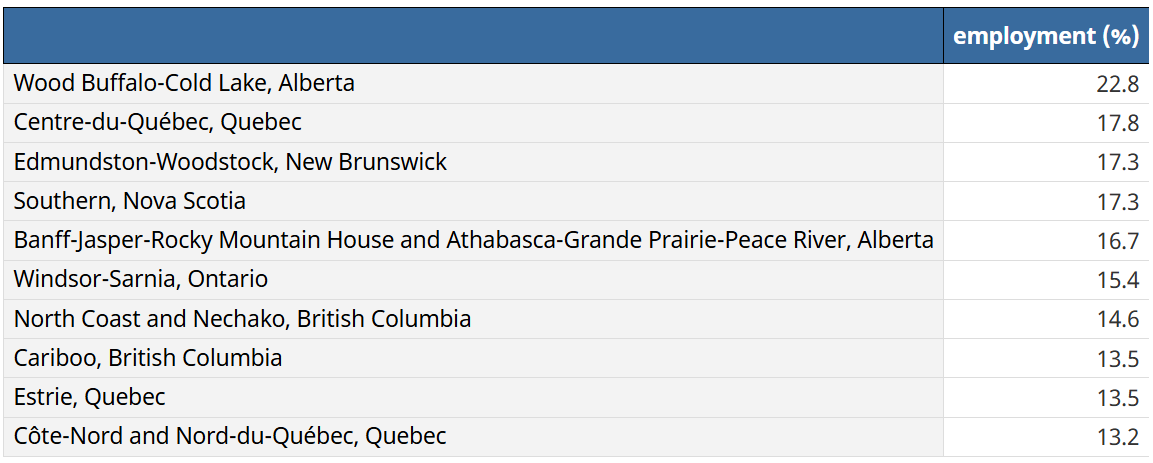StatCan numbers highlight which industries most dependent on US demand

Ontario Premier Doug Ford praised the federal government’s plan to secure the Canada-U.S. border in response to former U.S. president Donald Trump’s threat to impose a 25-per-cent tariff on Canadian imports.
Ford described the plan as “phenomenal” following a meeting with Finance and Intergovernmental Affairs Minister Dominic LeBlanc on Tuesday in Toronto, according to a report from The Canadian Press (CP).
Speaking to reporters after the meeting, Ford praised the “solid, solid plan”. He also urged Public Safety Minister David McGuinty to “get out there and put the plan in front of the Canadian people.”
Trump – who became the first US president to be reelected in office following a win in the 2024 election – has threatened to slap a 25-per-cent tariff on all products entering the U.S. from Canada and Mexico – unless the two countries can put a stop to the flow of drugs and migrants across their borders. Trump said he will put the tariff in place on Jan. 20, 2025, when he is inaugurated into office.
"This tariff will remain in effect until such time as drugs, in particular fentanyl, and all illegal aliens stop this invasion of our country!" Trump wrote on his social media platform Truth Social.
Various groups have previously called on the federal government to take decisive action following the tariff threat.
LeBlanc previously announced a $1.3-billion, six-year plan to secure the border, according to the CP report posted on Global News. He said he told Ford the money will allow the RCMP and the Canada Border Services Agency to use long-range drones and surveillance towers, create a joint air command, hire more officers and deploy 80 canine units to search for fentanyl, according to the report.
The federal cabinet is set to meet for a two-day retreat starting Jan. 20.
Industries dependent on American demand
Based on Labour Force Survey (LFS) annual employment estimates, in 2024, around 1.8 million people, representing 8.8 per cent of total employment, worked in industries where 35 per cent or more of jobs depended on US demand for Canadian exports, according to Statistics Canada (StatCan).
Industries with the highest proportion of employment dependent on US demand include:
- oil and gas extraction (74.3 per cent)
- pipeline transportation (71.7 per cent)
- primary metal manufacturing (60.8 per cent)
- transportation equipment manufacturing (56.0 per cent).
These industries are identified using the latest available estimates on value-added in exports from the System of Macroeconomic Accounts, according to StatCan.
The top 10 economic regions with a high proportion of employment in industries dependent on American demand in 2024 are:

“In 2024, workers with a high school diploma or a lower level of education (11.0 per cent) and those with post-secondary education below a bachelor's degree (9.4 per cent) were more likely to work in industries dependent on American demand for Canadian exports compared with those with a bachelor's degree or a higher level of education (6.7 per cent). Men (12.5 per cent; 1.3 million workers) were also more likely to work in these industries than women (4.7 per cent; 455,000),” says StatCan.
“Employment in industries dependent on US demand for Canadian exports tend to pay above-average wages. In 2024, the average hourly wage of employees working in these industries was $37.24, 6.5 per cent higher than for employees in other industries ($34.97).”
Small business confidence in Canada has taken a hit, according to the Canadian Federation of Independent Business. The long-term business optimism index, which measures 12-month expectations, fell to 56.4 in December, a three-point decline from the previous month. The short-term index, which reflects a three-month outlook, dropped five points to 46.6.
“The combined challenges of U.S. tariff threats, uncertainty stemming from the recently announced and temporary GST holiday, and the Canada Post strike have created a ‘perfect storm,’ reversing the upward trend in business optimism observed in recent months,” says the report.
Strengthening Canada’s border security
The government of Canada says it has introduced a comprehensive set of measures aimed at enhancing border security and improving the integrity of the immigration system. These initiatives address illegal crossings, fraud, and misinformation while ensuring fairness and efficiency in processing applications.
Reducing border volumes and illegal crossings:
- Expanded the Safe Third Country Agreement (STCA) with the U.S. to cover the entire land border, reducing illegal asylum claims from 165/day in March 2023 to 12/day.
- Implemented partial visa requirements for Mexican nationals, cutting asylum claims at airports by 97% and reducing southbound illegal crossings by 72%.
- Ended "flagpoling" (leaving and re-entering Canada for immigration services), reducing incidents by 86%, saving up to 8,000 workdays for U.S. border officials.
Enhancing information sharing: Starting in 2025, automated sharing of immigration data (eTA applicants, U.S. and Canadian permanent residents) with the U.S. will strengthen fraud detection and applicant screening.
Reinforcing immigration integrity:
- Introduced stricter scrutiny of visitor visa applications from high-risk countries, leading to:
- An 89% drop in illegal U.S. crossings by foreign nationals (June–December 2024).
- A 61% rise in visa refusals for high-risk countries.
- An 18% reduction in asylum claims by Canadian visa holders (October–November 2024).
- Ended automatic 10-year multiple-entry visas; decisions now based on applicants' purpose, finances, and immigration history.
Managing temporary resident arrivals:
- Reformed the International Student Program, verifying study permits directly with institutions, resulting in a 91% drop in illegal crossings by permit holders.
- Tightened eligibility for temporary workers, post-graduation work permits, and spousal permits.
- Addressed fraud in the Temporary Foreign Worker Program.
Combatting misinformation: Launched international campaigns in 10+ languages to provide accurate information on immigration, reducing exploitation and ensuring system trust.
Regulating immigration consultants:
- Proposed regulations for stronger penalties (up to $1.5M fines) for misconduct by paid representatives.
- Empowered the College of Immigration and Citizenship Consultants to discipline violators and compensate victims of unethical advisors.



